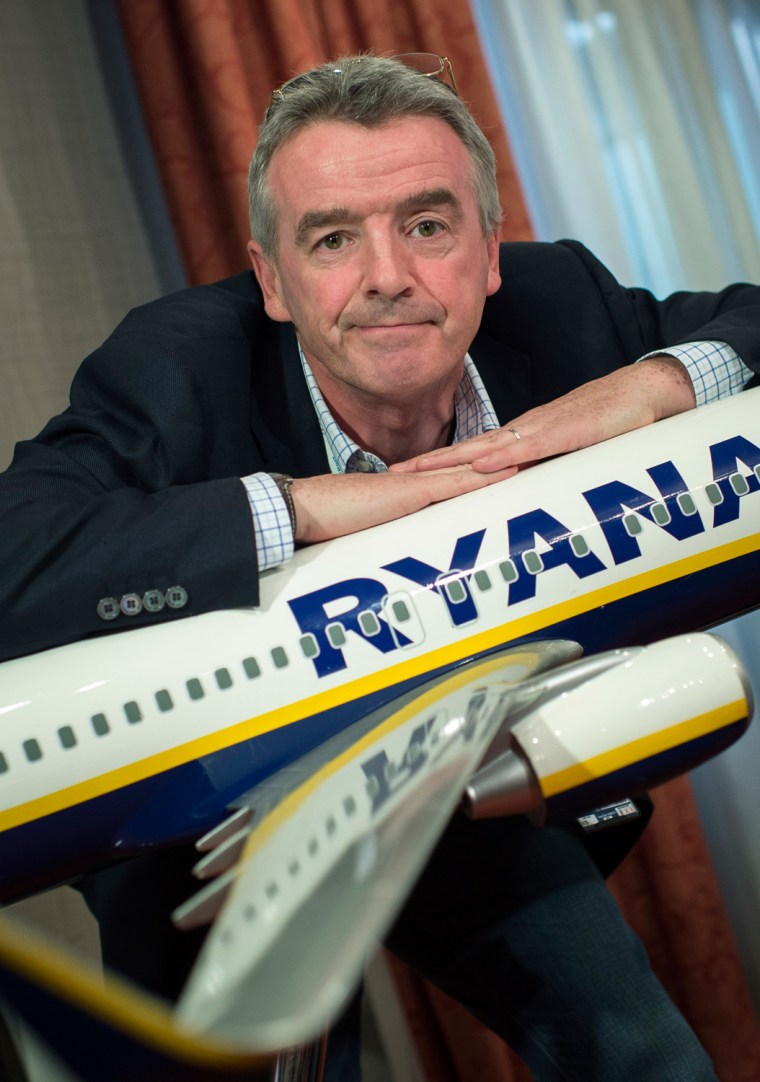Finally, an honest CEO.
Ryanair head Michael O'Leary called his customers "idiots" this week. The chief of the deep-discount, “gotcha”-dependent airline might be the first to say it, but he's hardly the first to think it.
O'Leary was speaking specifically about fliers who fail to print their boarding passes before they arrive at the airport, and are forced to pay Ryanair's 60-euro fee. The issue came to a head after a mom paid about $380 so her family could get the paperwork to fly home from Spain to Britain. She aired her concerns on Facebook and got hundreds of thousands of "likes." O'Leary responded to the controversy as many CEOs would after being administered a truth serum.
"We think Mrs. McLeod should pay 60 euros for being so stupid," he reportedly told The Telegraph before piling on the sarcasm. "She wasn't able to print her boarding card because, as you know, there are no Internet cafes in Alicante, no hotels where they could print them out for you, and you couldn't get to a fax machine so some friend at home can print them and fax them to you."
Even with a day or so to reflect, O'Leary only slightly changed his tune, arguing in the Irish Independent that his comments weren't aimed at the mom, specifically, but at his customers generally.
"I was not calling her stupid, but all those passengers are stupid who think we will change our policies or our fees," he said.
Ryanair occupies an important post in the gotcha world, having invented a-la-carte (i.e., sneaky) airline prices through bag fees, exit row seat fees, and has even threatened to impose potty fees. O'Leary is a trend-setter. Perhaps he'll start a trend for greater honesty, too.
'Stupidity fee'
He does have his defenders. While most of the Internet reacted in horror at the idea of a family paying $380 for 5 slips of paper valued at 5 cents, a certain set of consumers believes quite firmly in the concept of a "stupidity fee."
"I think it's about time an executive comes out and defends his policies," wrote one on my Facebook page. "It was in black & white, I don't know why the person was complaining."
In other words, companies can do whatever they wish, as long as it's disclosed. That's absurd, of course. In a famous April Fool's Day joke two years ago (and oft repeated), British firm GameStation got 7,500 members to agree to fine-print terms of service that included the phrase, "You agree to grant us a non-transferable option to claim, for now and forever more, your immortal soul."
Still, many people believe in the Tricks and Traps economy, which works like this: Discount retailers slash prices -- even below costs -- and coupon-clipping, rules-following, rebate-form expert consumers benefit. How is this possible? These bargain hunters and their $5 flights are subsidized by another set of consumers who screw up often and must overpay through tack-on fees and penalties. For years, the credit card market worked this way. Some consumers got thousands of frequent-flier miles, leading to free trips, while others paid their bills late and subsidized these perks through late fees.
In a landmark economics paper on this issue, two professors dubbed these winners and losers "sophisticates" and "myopes." Smart consumers -- the sophisticates -- should thank their lucky stars every day that clumsy myopes exist; otherwise, there would be no $5 flights from London to Dublin.
'Gotcha economy'
I hope you can see where this ends badly. When all companies' profits come from fees, they only survive by getting very good at handing out such punishments. They are incented not to provide good products, services or even prices -- only to be better and better at sneaky fees. This is something I call the "Gotcha economy." It is very far from a free market economy, which requires price transparency and rewards innovation. The Gotcha Economy rewards cheating.
It also rewards absurdity, which is how we end up with $380 fees for boarding passes. Another inevitable element of the Gotcha economy is that the punishments don't fit the crimes. Sure, it's fine to charge something for boarding passes (well, not in Spain, where a judge has ruled that it's the airline's responsibility to issue them). But the charge should bear some resemblance to the business cost of creating them. Again, a customer racing to arrive at the airport is not in a free market situation -- he or she can no longer bargain over boarding pass printing costs. This is what is sometimes called the "captive consumer" problem.
But take basic economics out of this situation, and there is a much larger problem that needs addressing. The entire concept of a stupidity fee is bogus; even Thomas Jefferson would agree with that.
If someone dropped $50 on the street, would it be OK to keep it? They were stupid for dropping it, weren't they? If you give a clerk a $20 but think it's a $10 when buying milk, is it OK for the store to keep the extra $10 because you were stupid?
No. When someone makes a mistake, they don't automatically surrender their right to fairness and justice under the law.
Recently, I was on a United Airlines flight when the pilot tried to forcefully close the cabin door, and the emergency water slide accidentally deployed. We were delayed for four hours. Think I was able to charge United a $150 change fee? What would have happened to me if I was four hours late to the airport? Stupidity taxes aren't fair because they are always one-sided. Only large corporations in dominant market positions can offer such take-it-or-leave-it terms and conditions. Even if you have no sympathy for a mom trying to get her kids to the airport, it's hard to deny that there's nothing free market about one-sided deals like that.
* Follow Bob Sullivan on Facebook.
* Follow Bob Sullivan on Twitter.
